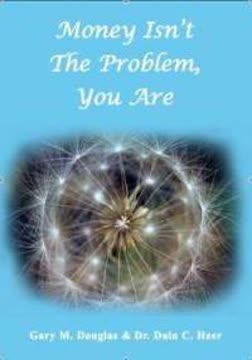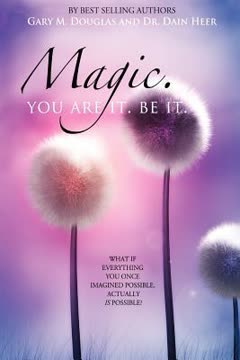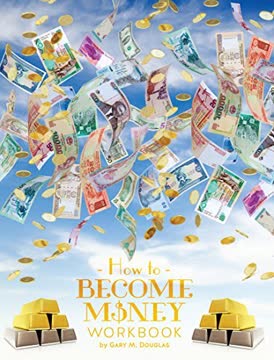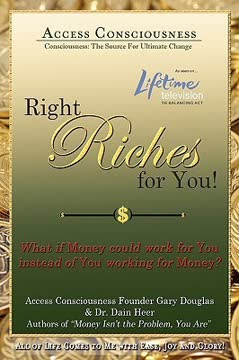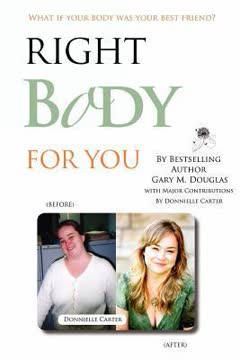Key Takeaways
1. Money problems are rarely about money; they're about your willingness to receive.
It’s not about money. It never is. It’s about what you’re willing to receive.
The root cause. The book challenges the common perception that financial struggles stem from a lack of money. Instead, it posits that the core issue lies in one's willingness to receive, not just money, but also opportunities, compliments, and the greatness of oneself. Many people unknowingly block the flow of abundance by resisting the act of receiving, often due to feelings of unworthiness or societal conditioning.
Shifting the focus. The authors illustrate this point with an anecdote about a friend who claimed to have a "money issue." They countered that the real problem was his unwillingness to receive. This highlights the importance of shifting the focus from external circumstances to internal blocks. By addressing these internal barriers, individuals can open themselves up to a greater flow of abundance.
Receiving freedom. The ultimate willingness to receive extends beyond material wealth to encompass the freedom of life itself. When one is open to receiving the fullness of life, money loses its perceived power as a solution. This perspective encourages individuals to cultivate a mindset of receptivity, allowing them to attract opportunities and resources that align with their desires.
2. Poverty consciousness is a state of mind, not a reflection of reality.
Poverty consciousness is not a reflection of how things really are: it’s a state of mind we create.
Abundance is natural. The book asserts that abundance is the natural state of the universe, contrasting it with the human-created concept of poverty consciousness. This mindset, characterized by thoughts of lack and limitation, prevents individuals from perceiving and experiencing the inherent abundance that surrounds them. It's a self-imposed barrier that restricts the flow of resources and opportunities.
Pride of poverty. The authors point out that poverty consciousness can manifest in various ways, including a sense of pride in being poor or a belief that it's morally superior to be wealthy. This mindset often leads to discomfort around affluent individuals and a self-limiting association with those at a similar socioeconomic level. It's a subtle form of self-sabotage that perpetuates financial struggles.
The word "want." The authors highlight the significance of the word "want" in perpetuating poverty consciousness. They explain that "want" implies a lack, and constantly expressing a desire for more money reinforces the feeling of not having enough. By consciously replacing "want" with phrases that convey abundance and expectation, individuals can begin to shift their mindset and attract greater financial prosperity.
3. Questions empower; answers limit. Live in the question to unlock possibilities.
When you live in the question, infinite possibilities are available.
The power of inquiry. The book emphasizes the importance of asking questions rather than seeking definitive answers. Questions open up possibilities and invite the universe to provide solutions, while answers limit one's perspective to what is already known. This approach encourages a mindset of curiosity and exploration, fostering creativity and innovation.
Limited vs. unlimited questions. The authors contrast limited questions, such as "How do I get from Point A to Point B?", with unlimited questions, such as "What would it take for _____ to show up?". Limited questions engage the mind in problem-solving, while unlimited questions invite the universe to provide unexpected and expansive opportunities.
Examples of empowering questions:
- "What would it take for more money to show up?"
- "What's right about this that I'm not getting?"
- "How does it get any better than this?"
By embracing the power of inquiry, individuals can break free from limiting beliefs and tap into a realm of infinite possibilities, attracting unexpected solutions and opportunities into their lives.
4. Perceive, Know, Be, and Receive: Unlock your limitations by embracing all aspects of reality.
In any area of your life that is not working for you, there is something you are not perceiving, not knowing, not being or not receiving.
The four pillars. The book introduces the concept of Perceive, Know, Be, and Receive as essential components for creating a fulfilling life. When an area of life is not working, it indicates a blockage in one or more of these areas. By consciously addressing these blockages, individuals can unlock their potential and create positive change.
Breaking it down:
- Perceive: Being aware of all aspects of a situation, without judgment.
- Know: Having a deep understanding and clarity about oneself and the world.
- Be: Embodying one's true self, without pretense or limitation.
- Receive: Being open to all possibilities and gifts that the universe offers.
The exercise. The authors suggest repeating the phrase "Perceive, know, be and receive what I refuse, dare not, must never and must also perceive, know, be and receive that will allow me total clarity and ease with _____" thirty times a day for three days. This exercise helps to identify and dismantle limiting beliefs, paving the way for greater clarity and ease in life.
5. Destroy and uncreate your life daily to create anew and stay on the creative edge.
You want to create your life every day. This means that every morning, you need to destroy and uncreate everything you were yesterday.
Fresh start. The book advocates for a daily practice of "destroying and uncreating" one's life to create a fresh start each day. This involves releasing past decisions, judgments, and limitations to make way for new possibilities. It's a way to avoid stagnation and stay on the creative edge of life.
Not literal destruction. The authors clarify that "destroying and uncreating" doesn't involve physical destruction or ending relationships. Instead, it's about dismantling limiting beliefs and judgments that hold one back. It's a mental and energetic clearing that allows for greater clarity and choice.
Questions to ask:
- "Everything I was yesterday, I now destroy and uncreate."
- "Who am I today and what grand and glorious adventure am I going to have?"
By embracing this daily practice, individuals can break free from the constraints of the past and create a life filled with joy, adventure, and unlimited possibilities.
6. Acknowledge ELFs (Evil Little Fucks) and rattlesnakes to protect yourself from their negativity.
Always acknowledge the ELFs and the rattlesnakes in your life. If you don’t acknowledge what they are, they can’t change. They can’t be any different.
Identifying negativity. The book introduces the concept of "ELFs" (Evil Little Fucks) and "rattlesnakes" to describe individuals who are intentionally negative or harmful. Recognizing these people and acknowledging their behavior is crucial for protecting oneself from their negativity. It's about seeing people as they are, not as one wishes them to be.
Observation, not judgment. Acknowledging ELFs and rattlesnakes is not about judging them, but about observing their behavior and setting appropriate boundaries. It's about recognizing that some people have a tendency to be mean or harmful, and taking steps to protect oneself from their actions.
Staying aware. By acknowledging the presence of ELFs and rattlesnakes, individuals can avoid being taken advantage of or manipulated. It's about staying aware of their tactics and refusing to engage in their negativity. This awareness empowers individuals to steer clear of harmful situations and maintain their own well-being.
7. Gifting and receiving, not give-and-take, creates true abundance.
With gifting and receiving, you have the elements that allow you to truly have a sense of communion with all things.
Beyond exchange. The book contrasts the common practice of "give-and-take" with the more expansive concept of "gifting and receiving." Give-and-take is based on the expectation of a return, while gifting and receiving involves giving without expectation and simultaneously receiving without limit. It's a flow of energy that creates true abundance.
Nature's example. The authors use nature as an example of gifting and receiving. Trees give fruit without expecting anything in return, and flowers offer their beauty and fragrance freely. This illustrates the power of giving without attachment and the abundance that results from this practice.
Breaking the cycle. By shifting from a give-and-take mindset to a gifting and receiving mindset, individuals can break free from the limitations of exchange and tap into a realm of unlimited abundance. It's about giving freely and being open to receiving all that the universe has to offer.
8. Humanoids, the creators, must embrace their unique nature and be willing to receive.
If you are interested in expansion, and in having a life that is abundant, comfortable and creative, stop trying to stuff yourself into a human mold.
Two species. The book introduces the concept of two distinct types of beings on Earth: humans and humanoids. Humans tend to be content with the status quo and resistant to change, while humanoids are creators, innovators, and seekers of expansion. Recognizing this distinction is crucial for understanding one's own nature and potential.
Humanoid traits. Humanoids are often characterized by their dissatisfaction with the status quo, their desire to create and innovate, and their tendency to judge themselves for not fitting in. They are the inventors, artists, and change-makers of the world.
Embracing uniqueness. The authors encourage humanoids to embrace their unique nature and stop trying to conform to human expectations. By acknowledging their creative potential and being willing to receive the abundance that comes with it, humanoids can unlock their full potential and create a life of joy, fulfillment, and prosperity.
9. Celebrate your life daily to attract joy and abundance.
If you make your life a celebration, if you look for the joy of life instead of the doldrums, you’ll create a whole different reality.
Celebration as a choice. The book emphasizes the importance of making life a celebration, rather than focusing on obligations, work, and drama. By consciously choosing to celebrate each day, individuals can attract more joy, abundance, and positive experiences into their lives.
Shifting perspective. The authors share personal anecdotes to illustrate the power of celebration. This involves using fine china every day, drinking champagne, and prioritizing joy over obligation. It's about creating a mindset of appreciation and gratitude for the present moment.
Infinite possibilities. By embracing a celebratory approach to life, individuals can open themselves up to infinite possibilities and create a reality filled with joy, abundance, and fulfillment. It's about choosing to live each day to the fullest and appreciating the gifts that life has to offer.
Last updated:
FAQ
What is "Money Isn't the Problem, You Are" by Gary M. Douglas about?
- Core Premise: The book challenges the idea that money itself is the root of financial struggles, arguing instead that personal limitations and unwillingness to receive are the real obstacles.
- Access Consciousness Tools: It introduces tools and philosophies from Access Consciousness, an energy transformation system developed by the author, to help readers change their relationship with money.
- Focus on Receiving: The central message is that abundance is natural, and by shifting mindset and being open to receiving, anyone can change their financial reality.
- Practical Exercises: The book is filled with practical questions, exercises, and real-life anecdotes to help readers identify and break through their self-imposed limitations around money.
Why should I read "Money Isn't the Problem, You Are" by Gary M. Douglas?
- Transform Limiting Beliefs: If you feel stuck in recurring money problems, the book offers a fresh perspective that goes beyond traditional financial advice.
- Actionable Tools: It provides simple, actionable tools and questions designed to create immediate shifts in your financial and personal life.
- Holistic Approach: The book addresses not just money, but also self-worth, judgment, relationships, and the willingness to receive abundance in all forms.
- Empowering Mindset: Readers are encouraged to claim their greatness and step into a more empowered, joyful, and abundant way of living.
What are the key takeaways from "Money Isn't the Problem, You Are" by Gary M. Douglas?
- Money is Not the Issue: The real problem is not money, but your willingness to receive and your beliefs about yourself.
- Abundance is Natural: The universe is inherently abundant, and scarcity is a mindset, not a reality.
- Language Matters: Words like "want" reinforce lack; changing your language can shift your experience.
- Live in the Question: Asking open-ended questions invites new possibilities and solutions, rather than limiting yourself with fixed answers.
How does Gary M. Douglas define "receiving" in "Money Isn't the Problem, You Are"?
- Beyond Money: Receiving is not just about accepting money, but being open to all forms of abundance, including help, love, and opportunities.
- Judgment Blocks Receiving: Every judgment you hold—positive or negative—limits your capacity to receive beyond that judgment.
- Energetic Openness: True receiving means being energetically open to whatever the universe offers, without resistance or expectation.
- Receiving Yourself: The greatest thing you can receive is the greatness of who you truly are; this is the foundation for all other forms of abundance.
What are the main tools and questions from Access Consciousness shared in "Money Isn't the Problem, You Are"?
- Live in the Question: Use questions like "What would it take for ___ to show up?" and "How does it get any better than this?" to invite new possibilities.
- Destroy and Uncreate: Start each day by destroying and uncreating everything you were yesterday to create your life anew.
- Perceive, Know, Be, and Receive: Repeat questions that unlock your awareness and remove limitations, such as "What must I perceive, know, be and receive that would allow me to ___?"
- Interesting Point of View: Use this phrase to release judgment and stay in allowance of yourself and others.
How does "Money Isn't the Problem, You Are" by Gary M. Douglas address the concept of "poverty consciousness"?
- Definition: Poverty consciousness is a mindset that focuses on lack, limitation, and the belief that scarcity is more real or noble than abundance.
- Language Patterns: The book highlights how using words like "want" (which means "to lack") perpetuates poverty consciousness.
- Breaking the Cycle: By recognizing and changing these thought patterns, you can shift from scarcity to abundance.
- Abundance as Default: The natural state of the universe is abundance; poverty is a human-created concept.
What is the "10 Percent Tithing to the Church of You" method in "Money Isn't the Problem, You Are"?
- Set Aside 10%: Put away 10% of all income for yourself, not to be spent, but to honor your own abundance.
- Signal to the Universe: This act demonstrates to the universe that you value money and are ready to receive more.
- Not for Bills or Investments: The 10% is not for paying bills or investing; it is simply to have and to create a sense of wealth.
- Results: The book shares anecdotes of people whose financial situations improved dramatically after consistently applying this practice.
How does "Money Isn't the Problem, You Are" by Gary M. Douglas suggest dealing with debt and credit?
- Reframe Debt: View debt as "past expenditures" rather than a burden, to remove the emotional charge and historical baggage.
- Focus on Cash Flow: Shift attention from building credit to increasing cash flow and cash worthiness.
- Avoid Carrying Debt: The book encourages living with the cash you have, rather than relying on credit cards and accumulating debt.
- Energetic Impact: The language and mindset around debt can keep you stuck; changing your perspective can help clear it.
What is the difference between "give-and-take" and "gifting and receiving" in "Money Isn't the Problem, You Are"?
- Give-and-Take: This is an exchange-based mindset where giving is tied to expecting something in return, leading to limitation and obligation.
- Gifting and Receiving: True gifting is giving without expectation, and true receiving is accepting without obligation; both happen simultaneously and create abundance.
- Nature as Example: The book uses nature as a model, where everything gifts and receives freely, without keeping score.
- Abundance Flows: When you move from give-and-take to gifting and receiving, you open yourself to greater abundance and joy.
How does "Money Isn't the Problem, You Are" by Gary M. Douglas recommend handling difficult people (ELFs and rattlesnakes)?
- Awareness Over Judgment: Recognize and acknowledge the true nature of difficult people (ELFs: Evil Little F***s, and rattlesnakes) without judgment.
- Stay in Allowance: Be the "rock in the stream"—let their behavior flow around you without resistance or reaction.
- No Vested Interest: Don’t be attached to outcomes or try to change them; maintain your own clarity and boundaries.
- Pull Energy: Use energetic tools like pulling energy from them to neutralize their impact and maintain your own space.
What is the significance of "living in the question" in "Money Isn't the Problem, You Are"?
- Opens Possibilities: Asking questions rather than seeking fixed answers invites the universe to present new opportunities and solutions.
- Empowers Change: Questions like "What else is possible?" and "How does it get any better than this?" keep you out of limitation and in a state of creation.
- Avoids Stagnation: Answers close doors, while questions keep you moving forward and expanding.
- Daily Practice: The book encourages making questioning a daily habit to continually create a greater life.
What are the best quotes from "Money Isn't the Problem, You Are" by Gary M. Douglas and what do they mean?
- "Money is never the solution because money is never the problem." – Reminds readers that the root of financial issues lies within, not in external circumstances.
- "The truth always makes you feel lighter. A lie always makes you feel heavier." – Encourages using your feelings as a guide to discern truth from falsehood in your beliefs about money.
- "If you’re willing to receive the greatness of who you truly are, the world will then gift to you what you truly deserve." – Emphasizes the importance of self-acceptance and openness to abundance.
- "All of life comes to me with ease and joy and glory." – The Access Consciousness mantra, suggesting that embracing all experiences (good and bad) with joy leads to a more abundant life.
- "Just for today, my life will be a celebration." – Encourages living each day as a celebration, which attracts more joy and abundance.
Review Summary
Money Isn't the Problem, You Are receives mostly positive reviews. Readers appreciate its unique perspective on money and abundance, praising its practical tips and paradigm-shifting ideas. Many find it helpful for changing their mindset about finances and other life areas. Some readers note the book's spiritual and metaphysical approach, which resonates with many but not all. Criticisms include questionable translation quality in non-English versions and some readers finding the content too abstract or cult-like. Overall, most reviewers found value in the book's teachings on receiving, self-awareness, and changing one's relationship with money.
Similar Books
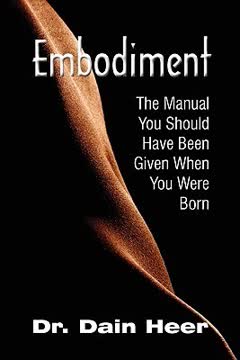
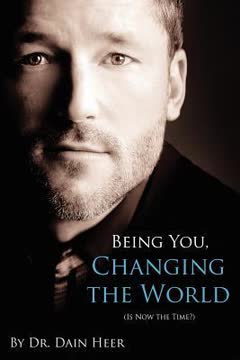

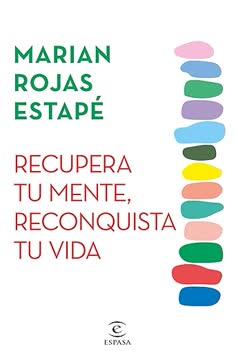
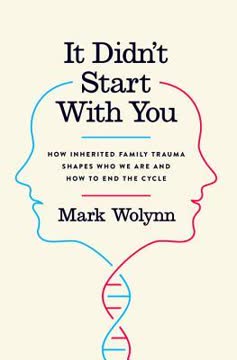
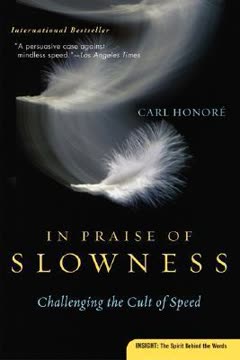
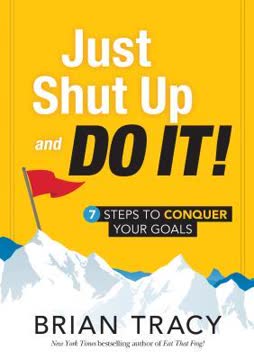
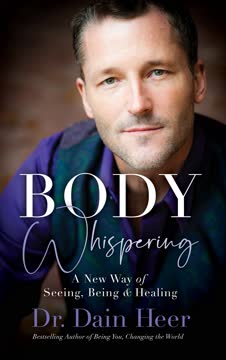
Download PDF
Download EPUB
.epub digital book format is ideal for reading ebooks on phones, tablets, and e-readers.
